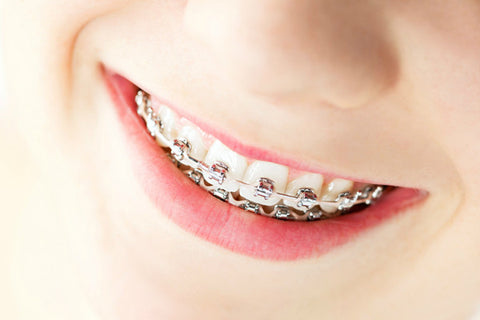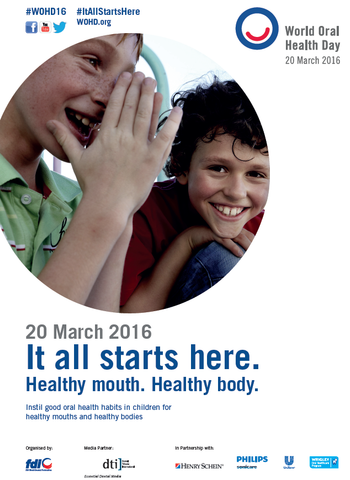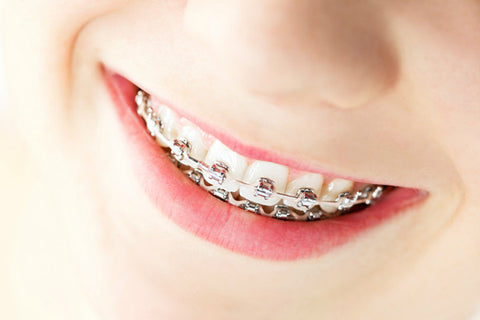What Are the Long Term Benefits of Introducing Orthodontics From an Early Age? 0
Although the common age to begin orthodontic treatment usually comes at the start of patients’ teenage years, introducing orthodontics from an early age could greatly reduce the need for more extensive and costly work further down the line. In fact a recent study from the American Journal of Orthodontics & Dentofacial Orthopedics, reports that many young children may benefit from orthodontic correction from as young as 6 years old.

The first permanent adult teeth will appear in children of around 6 years, just before their first baby teeth start to fall out. A lot of children will grow into their adult teeth without any trouble, however there are a few problems that can occur as the new teeth start to come through:
- Teeth can protrude out significantly, which can be exacerbated by thumb sucking from an early age
- A lack of space for the new teeth may lead to overcrowding and a misaligned bite
- There may also be too much space for the new teeth, called the ‘ugly duckling’ stage of development. Excess space usually closes with growth, though this is not necessarily always the case
- There may be a retention of the baby incisors, which can prevent the adult successors from coming through or lead them to develop over them
The study looked at the potentially damaging effects of protruding teeth in children from the ages of 6-10. It found that almost a third of children who were treated for severely protruding teeth were less likely to experience dental trauma, such as a chipped, broken, or knocked out permanent tooth.
As many children are highly active and enjoy sports or activities where there’s a higher risk of trauma, it’s advised that those in particular with severely protruding teeth, should visit their orthodontist early on. Not only will this reduce their risk of injury, it will also help to guide their teeth into a healthier position and could prevent the need for further orthodontic treatment when they’re older. In addition, in this early stage where children can be sensitive, having orthodontic treatment can help them to feel more confident in their smile as they grow.
Early Orthodontics – What Are the Options?

There are three main types of orthodontics suitable for children from a young age:
Preventative orthodontics
Preventative treatment can help avoid a malocclusion from developing due to spacing issues – tooth crowding or a misaligned bite. Here an orthodontist will be able to create enough space for the permanent teeth to come through normally. A common method is using a space maintainer.
Interceptive orthodontics
For children from the age of 6 years, visiting an orthodontist can catch problems early on before they develop into more severe dental issues. The risk of protruding teeth, especially through thumb sucking, can be corrected and reduce the need for later comprehensive orthodontic treatment. Permanent teeth can also be guided into the correct positions through tooth removal or size adjustment.
Comprehensive orthodontics
This is the typical treatment that teenagers receive to align the teeth and bite, however carrying out necessary comprehensive orthodontics from an early age, will again help to reduce the need for more complex and long-term treatment when they’re older. Children can have treatments including wearing realigning headgear or having fixed retainers to help close gaps and align their new adult teeth.
If you’d like to find out more about orthodontics for children, or to discuss your child’s orthodontic treatment, you can call the Northenden House team on 0161 9982622, or contact us here to book your initial consultation.
- Blue Horizons
- Tags: brace care children's dental care children's orthodontics Orthodontics
How Celebrities and Social Media Are Making Dental Braces More Popular 0
Dental braces have traditionally never been a popular thing. In fact, they’re notoriously associated with the opposite – awkward teenagers dreading being known as the ‘brace-face’ or ‘metal-mouth’ amongst their group. However dental braces have come a long way since their big and bulky ancestors; modern braces are now much smaller and less noticeable, and newer technologies allow for faster, more comfortable treatments. Whereas a few decades ago, people would pass up on the opportunity to have braces as they’d be anxious about their appearance, they have now become a much more accepted treatment for teens and adults alike.
A major influencing factor in the gaining popularity of dental braces is the celebrity uptake. Many Hollywood stars, singers, sporting legends and even royals have embraced the brace in their bid to wow their audiences with a perfectly straight smile. And not just in their teenage years – Tom Cruise, Nicholas Cage and Gwen Stefani have all opted for braces as adults, in view of the public. That train tracks have become accepted in the celebrity sphere where up keeping appearances is a must, provides people with positive encouragement to wear braces and improve their oral health and smile.
Though celebrities straightening their teeth with orthodontics is no new thing, social media coverage has really help to boost support on the braces front. TV presenter and Loose Women panellist, Andrea McLean, recently decided to have braces fitted alongside her 14-year-old son Finlay. Although she avoided having them as a teenager, as they were no-popular thing, the positive encouragement she and her son have received on social media greatly shows the increased acceptance of dental braces and their more positive cultural appeal.
Thank you for all your kind comments about my braces today on @loosewomen
— Andrea McLean (@andrea_mclean) February 4, 2016
Fin and I are now Brace Faces together! pic.twitter.com/6W5gu7OKiu
As a widely used and extremely effective treatment, many people are now choosing to advocate wearing braces on social sites such as Twitter and Facebook, posting pictures of their newly fitted appliances and taking their friends and followers through their journey to a straighter set of teeth. Ultimately social sites are offering those wearing dental braces a community, where there is a newfound confidence that comes with improving their smiles. From traditional metal, to brightly coloured and natural-looking ceramic braces, there are many dental braces available to suit your needs to get the smile you’ve always wanted. You can see case studies of some of our patients with ceramic braces here, or contact us on 0161 998 2622 to discuss your requirements and book a consultation.
- Blue Horizons
- Tags: Adult braces oral health Orthodontics traditional braces
Support World Oral Health Day - a Healthy Mouth Makes a Healthy Body 0
The 20th March marks another of the World Dental Federation’s (FDI) annual celebrations of oral hygiene and health on an international scale. World Oral Health Day will be a key event this year for many, looking to raise awareness of oral health issues and promote a healthy mouth and body.
Why is WOHD so important?
Research from the FDI has found that 90% of the world’s population will suffer from oral diseases in their lifetime. Dental caries, or tooth decay is the most prevalent oral concern, where it’s been reported that 92% of adults between the ages of 20 to 64 have had tooth decay in their permanent teeth.
Although oral diseases in both children and adults are higher among poor or disadvantaged population groups, it is a worldwide issue, which is increased by factors including an unhealthy diet, tobacco use, harmful alcohol use and poor oral hygiene. However, the rates of oral diseases can be lowered with improved governmental, health association and society support and funding for prevention, detection and treatment.
Oral hygiene and health is important for people no matter their age, which is why WOHD is so vital an event to take part in.

How we can all help make a change
As of 2013, WOHD has been celebrated on the 20th March through a wide range of activities across the globe. Anyone can get involved in the activities this year, run by health associations, FDI member organisations and partners, governmental groups, students, teachers and the public in general. Sporting the hashtag, #WOHD16, these activities will help to highlight oral health concerns and their effects, and inspire change from influencing bodies. You can use the hashtag to find events in your local area.
This year, the theme for WOHD emphasises the need to drive an all-encompassing movement of change in understandings and attitudes towards oral health: ‘It all starts here. Healthy mouth. Healthy body’. The FDI has provided a number of posters, toolkits and templates which can be adapted and localised for your own events and activities.
Right now you can customise your own poster to be printed or shared via social media. The FDI has also received videos from around the world, from people giving a personal view of the importance of oral health and showing their support WOHD 2016.
The FDI acts as the main representative body for more than one million dentists worldwide, developing health policies and education programmes, and supporting member associations in overall oral health promotion activities. Their WOHD creates a unified platform for the dental and oral health community to take action against oral disease and help with the advancement of oral health around the world.
For more information or for any questions related to your oral health, please call us on 0161 998 2622 or email info@manchesterorthodontics.co.uk.
- Blue Horizons
- Tags: oral health Orthodontics world oral health day
How Orthodontic Treatment Can Benefit Your Child 1
Children and teenagers can often be more easily affected by first impressions and especially conscious of their own. Having a great smile can make a lasting difference to their self-esteem, as well as their overall health. That’s why orthodontic treatment is such an important consideration for your child, so that they can feel confident and happy in their smile and the first impressions they’ll make. But at what age should you consider your child’s orthodontic treatment, what type of treatment will be best for them and what will it involve?
When to take your child to the orthodontist
There are different phases for orthodontic treatment; Phase One occurs when the child is around the age of eight or nine, known as early treatment. The second phase will take place for children from around the age of eleven, into the teenage years. Although currently, most children receive treatment when they’re around twelve years old, earlier orthodontic treatment can save a lot of time, money and inconvenience when it comes to Phase Two.
In fact, health bodies such as The American Association of Orthodontists, advise that children go for an orthodontic screening as early as seven years old. This way, an orthodontist can look for potential problems with jaw alignment and bite as they grow. An early examination can also help find extrusions which are likely to create spacing problems, if all the adult teeth haven’t come through. You’ll then be advised on the best solution for your child, or whether they’ll need future treatment at all.
Why your child might need orthodontic treatment
Overcrowded, crooked teeth, or a misaligned bite, though common in children and teenagers, can not only lead to poor oral health and wear or damage the teeth, they can also place pressure on the jaw and cause irregular growth – changing the facial structure. One of the factors that can contribute to orthodontic problems in children is thumb sucking, as it can cause the lower teeth to become set back or the upper teeth to protrude forward. Early intervention, therefore, is sometimes necessary to prevent enduring tooth and jaw problems. Orthodontics is most effective at an earlier age, before a child’s jaw stops developing, which is usually towards their adult years. Signs that your child may need orthodontic treatment include:
- If your child continues thumb sucking after 5 years of age
- Lisps or speech impediments
- Teeth are protruding, or don’t come together normally
- Crowding of the front teeth begins at around the age of seven or eight
- Your child has difficulty chewing or biting
- A shift in the jaw when they open or close their mouth
- They are breathing through their mouth
Phase One treatments in most cases begin once all of the adult teeth have started to come through and use methods and appliances to correct the position of the jaw and dental arches. If your child’s orthodontist sees that teeth coming through will likely cause crowding or other issues, they can use interceptive orthodontics to shift the size of the dental arch for better teeth positioning. This will decrease the likelihood of teeth having to be removed or additional orthodontic treatment as your child reaches teenage years, however Phase Two treatment is usually still needed. The future treatment will mostly be a lot shorter and less expensive though.

How an orthodontist can help improve your child’s teeth
Investing in orthodontic treatment for your child at an earlier stage, can prevent them needing it when they’re an adult, where it often takes longer and surgery may have to be involved. If you’re considering orthodontic treatment for your child, here are the problems it can help to correct:
- Orthodontics for your child can help to correct protruding upper front teeth, improving oral health, the appearance of the teeth, as well as reducing the risk of traumatic injury to the upper teeth.
- Crowded or asymmetrical teeth can be straightened and guided into a healthier position by creating space for teeth to grow. This will also help to correct damage to the teeth and shifting of the jaw over time.
- Incorrect bites can be corrected as orthodontics will guide the growth of the jaws, reducing the chances of abnormalities.
Most treatment will involve the use of braces, which are extremely effective and are much more comfortable and smaller than previously. You can check whether your child is permissible for free NHS orthodontic treatment, if they’re under the age of 18. At Northenden House Orthodontics we offer a wide choice of treatment options for children and can carry out treatment from NHS referrals. If you’d like to speak to us regarding treatment for your child, or to book your consultation, please contact the practice on 0161 998 2622 or email info@manchesterorthodontics.co.uk.
- Blue Horizons
- Tags: brace care children's dental care children's orthodontics Orthodontics traditional braces
Foods to Avoid This Christmas If You’re Wearing Braces 0
Now that Christmas is just a few weeks away, so too are the decadent and delicious festive foods that will take centre place on the dinner table. However, if you’re wearing braces during this time, it’s important to consider foods that could be damaging to your braces and teeth, however tempting they may be, and what you can eat on the day so you can still fully enjoy the celebrations.
Although there are many traditional treats available at this time of year, sugary, chewy and hard foods should be avoided, as they could get caught in your braces and damage or break them. Food particles could even become lodged in the crevices of the braces and lead to tooth decay or other oral health problems if not cleaned away properly. It may seem difficult, but resisting these sweet, sticky or hard foods will ensure the effectiveness of your orthodontic treatment and that the smile you want can be achieved as quickly as possible and without complication. Here we’ve put together a list of foods best to avoid whilst wearing braces this Christmas, as well as foods which you can eat:
Candy canes - Candy canes decorating the Christmas tree or boiled or chewy sweets adorning gingerbread houses, are commonly consumed at Christmas. Although it’s fine to indulge, when braces are involved the chewy sweets can bend wires and harder sweets can pop brackets. Damaging your braces could lead to further treatment costs for repair, or cause a delay in treatment. Foods high in sugar are also more easily damaging to braces wearers’ teeth, as teeth are harder to clean - sugary foods can rot teeth and cause tooth decay and discolouration if teeth aren’t brushed or flossed properly.
Christmas pudding - Besides being high in sugar, festive chewy desserts like Christmas pudding or mince pies can get caught in your teeth. Chewy food can clog up your braces and make eating and chewing difficult, and may well be embarrassing trying to deal with if you have guests around. Chewy foods can also pull the wires off your braces or make them difficult to clean. Again, if your braces and teeth aren’t cleaned properly, cavities, plaque or other tooth problems may result.
Ice cubes - For those celebrating Christmas with your favourite drinks, chewing on the ice cubes should be avoided, as this could seriously damage both your braces and your teeth and create unwanted dental bills. Also, if you’ll be drinking sugary beverages, make sure to take the proper care of your teeth afterwards!
Hard vegetables - Despite vegetables being good for your health, raw vegetable snacks, or other hard festive foods such as stone fruits or crunchy nuts, can damage the wires and brackets of braces quite easily if you’re not careful. Hard foods should be avoided if possible, and vegetables can be made more manageable by being boiled and cut into smaller pieces.
What You Can Eat
If you’ll be wearing braces this Christmas, it doesn’t mean that you can’t enjoy the treats you love to eat, yet you might need to be more careful not to have anything that could damage your braces or leave stains on your teeth once your braces are finally removed. Just remember to take it slowly when you’re eating and you’ll better avoid discomfort or any sudden issues whilst chewing. Here are some festive foods that you can enjoy with braces:
The main Christmas dinner components, such as the turkey, potatoes and vegetables are fine to eat so long as the vegetables are cooked well and cut up into more manageable pieces.
Alternatives to a sticky Christmas pudding include ice cream, or a festive chocolate log which can be more easily cleaned from the wires and brackets, and won’t be as difficult to chew. Alcohol or sugary beverages are best switched for water or a low sugar squash, to lessen the risks of sugar hiding within the brackets and teeth, which can eventually lead to tooth decay. One day of indulgence won’t hurt though, so long as you remember to clean your teeth properly afterwards!
However, if damage does occur to your braces or teeth over the festive period, you can contact the Northenden House dental practice for the earliest possible appointment on 0161 998 2622.
- Blue Horizons
- Tags: brace care healthy mouth Orthodontics

